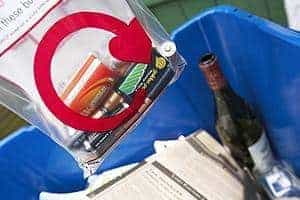
I'm keen to hear local authorities' views on the compliance options we've outlined in the consultation.
Malcolm Wicks
It is one of the stakeholder organisations feeding its views on possible new battery regulations within a government consultation set to close in 10 days' time.
Although trials of kerbside collection schemes for batteries have already taken place, the LGA is questioning the practicality of councils adding batteries to existing kerbside collection services.
In particular, the LGA's policy consultant, Alice Roberts, told letsrecycle.com the move could create “substantial” extra costs and cause potential contamination problems for materials recycling facilities.
More than half of the current battery recycling trials run by WRAP, the Waste and Resources Action Programme, have looked at kerbside systems. Some of those taking part have already reported “huge success” (see letsrecycle.com story).
But Ms Roberts said: “We have never felt that kerbside collections are the most cost effective means of collecting and we are concerned that it is often reported that it costs nothing.
“Some councils have said it is fine and very cheap and others say their contractor has quoted a very substantial cost,” she added.
Under the EU Battery Directive, new UK regulations are to be in place by September 2008, with experts suggesting that the collection of household batteries will be a key challenge.
Visible
Instead of collecting batteries at the kerbside, Ms Roberts suggested that batteries could be collected in “much more visible” places like schools, offices and shops.
Collection points would mean a much lower price for the battery producers, she claimed, since the producers would have to foot the bill under the forthcoming regulations.
She explained: “The evidence of how batteries are collected in other countries is not at the kerbside and they do it quite well. Ultimately the producers will want to go for a cheaper option.”
WRAP
Chris Davey, who is managing the battery collection trials at WRAP, would not pre-empt WRAP's position with regards to kerbside collections, ahead of the publication of a final report to be submitted to Defra later this month.
However, he said that he suspected a mix of solutions would be needed to meet the Battery Directive targets of recycling 25% of portable batteries by 2012, rather than one single mechanism.
He said: “I'm very positive about kerbside but we need to make sure it is funded. It must not be a burden for local authorities. It should form part of the mix provided local authorities and their contractors are fully funded – it's for compliance schemes to decide.”
Mr Davey added that WRAP had started a few battery collection trials to collect cells used by fire services and NHS trusts – as batteries used by businesses and institutions could also play a part.
He said: “I see no reason why the country should not reach the target. The second target – to collect 45% of batteries by 2016 – will be more challenging, but we need to aim for the 25% by 2012 first.”
BERR
The comments on possible battery recycling schemes came as the department for Business, Enterprise and Regulatory Reform urged local authorities to send in their views within the public consultation on the regulations, set to end on March 13.
Energy minister Malcolm Wicks said: “Since the introduction of this government's waste strategies, we've continuously sought ways to manage waste more effectively. We already collect and recycle around 90% of our automotive and lead acid batteries and I'm keen to hear local authorities' views on the compliance options we've outlined in the consultation.”
Joan Ruddock, minister for waste and recycling at Defra, added: “Historically the UK has had less incentive to recycle waste items than many other EU member states due to the low cost of landfill. The approximate 3% of disposable batteries that don't end up in UK landfill are currently exported to Europe for recycling but from September that will change and an effective collection network will need to be developed if we're going to meet the Directive's challenging targets.”
The collection and recycling of batteries will be discussed on the first day of this year's Recycling and Waste Forum, on April 16. The event at the National Motorcycle Museum, Birmingham, will include speakers from BERR, Defra and WRAP discussing the recycling of batteries and the forthcoming regulations. Click here for more information and the chance to book your place.












Subscribe for free